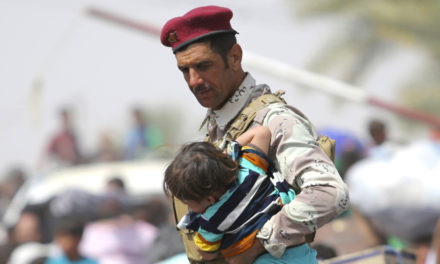On May 12, 2018 the Iraqi people went to cast their votes inside and outside the country. Although the election in terms of security was a success, much has happened that put the credibility of its results in question.
The first indicator that there was a problem started in Sulaymaniyah during the evening of election day, where election observers from Gorran, Coalition of Democracy and Justice, and New Generation began to complain about the polling process and claimed the unofficial results were unrealistic. Upon that, forces belonging to the Patriotic Union of Kurdistan had a standoff with guards and people gathered at the party headquarters of Gorran in Sulaymaniyah, leading to a violent gun battle.
Furthermore, reports and videos started to emerge showing some serious violation of ballot boxes outside of Iraq. Complaints started to stagger and evidence started to accumulate which led the Iraqi parliament to hold an emergency session on May 19 to discuss these violations.
Furthermore, the Council of Ministers established on May 24 a high committee to look into the reports regarding the election. Members of this committee consisted of the head of federal board of supreme audit, head of the national intelligence apparatus, head of the national security advisory, acting head of the integrity commission, deputy interior minister and head of the election security commission. The task of this commission was to look into the reports and information regarding the election that was discussed in the emergency meeting of the Council of Ministers.
The committee took several measures to investigate the issue, including looking at several reports by the Board of Supreme Audit and the Iraqi intelligence, as well as reports by Iraq’s national team for cyber security (CERT). Upon that, the committee summoned several Independent High Electoral Commission (IHEC) officials to attend a meeting. The officials included the IHEC commissioner, IHEC head of electoral circle, head of expat elections, and head of information security at IHEC. The committee also requested from IHEC to provide specific material for further investigation. Nevertheless, IHEC officials did not attend although the committee specifically emphasized the importance of their presence.
After the investigation, the committee issued a report on May 29, 2018 containing several worrying conclusions:
For starters, there were serious issues in terms of the hardware and software security of the polling devices. Amongst these issues where the use of an outdated version of Android to run the election devices; the SDRAM of the system was not subject to any security procedures; the application used was not secure; the same password was used on many devices; there were inconsistencies in the information stored in the device in comparison to the polling ballots.
Furthermore, the committee received information that deliberate tampering had happened by the heads of the polling stations in Iran, Turkey, Jordan, the United States, Germany, Great Britain, and Lebanon. This was in the form of directing voters to vote for specific political parties in coordination with people inside the electoral commission. Furthermore, some of these parties got access to the names of Iraqi citizens from the Ministry of Interior and registered them manually in the expat voter records in order to steal their votes for specific political parties.
The committee also pointed out that there were situations where election cards where gathered in hordes, often purchased from their owners, and used to vote in favor of specific candidates. The devices showed repeated fingerprints used in some voting stations to vote for the same candidate or party. Some polling stations had a 100% or more participation rate which; showed fraud had been going on in these stations. Also, in Anbar several ballot boxes were cancelled without clear justification.
Many other violations happened in Anbar, Nineveh, and Salahudin, especially in Internally Displaced Persons (IDP) camps where people were coerced to vote for specific parties or candidates.
All this and more led the committee to make the following recommendations:
- Not to use the electronic voting system in the future, including the upcoming provincial elections set for December 2018, and the installation of cameras in polling stations.
- Suggestion to amend the electoral law so that judges run IHEC.
- Canceling the election results from outside country voting.
- Canceling the IDP election results in several camps.
- Prosecution of the IHEC officials who tempered with the election results based on the law.
- The manual recount of at least 5% of the total polling stations in all provinces for the purpose of auditing and crosschecking.
Upon that, the parliament voted to amend the election law on June 6, and the judiciary set July 10, 2018 as the time for the higher judiciary council to meet in order to choose the judges who will perform the duties of IHEC commissioners and supervise the manual recount of the election results.
By that, the story of IHEC’s current commissioners comes to an end, leaving Iraq in a peculiar situation. While it is still possible to save Iraq’s election, it is also paramount to avoid in the future the decision-making style leading to the recent development. Iraq’s system is designed in a way that leaves the future of the whole country and its people in the hands of a single organization that is supposed to be independent. Such an organization is supposed to be well managed, transparent, and effective.
Sadly, IHEC was not up the challenges and showed some serious misconduct. The fact that it did not hire a company to perform a security audit on the voting devices shows how reckless IHEC was in dealing with the election.
On a practical level, it became also clear that the polling process was not well designed. For instance, using the dedicated pen to cast the vote was hard to perform for elderly people and visually impaired voters because it required a lot of accuracy, causing many ballots to become void.
Last but not least, a significant part of the responsibility for the low voter turnout lies on the shoulders of IHEC, who had a very weak media campaign in order to encourage people to vote.
Iraq prides itself on having free and fair elections, something that most countries in the region cannot say about themselves. But in order for Iraq to keep its rare democratic status, it must protect the electoral process from fraud and excel in its management.

Muhammad Al-Waeli
Muhammad Al-Waeli is an Iraqi commentator on political and social issues. He is currently doing a PhD in Human Resource Management and is interested in politics, media, and development.










